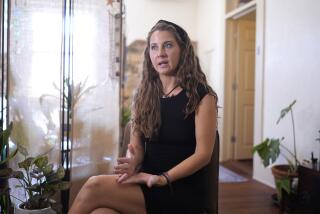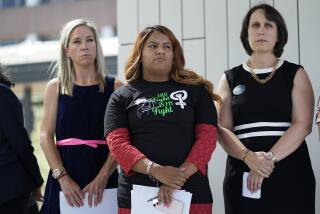Schiavo Called Beyond Saving
- Share via
PINELLAS PARK, Fla. — A spokesman for Terri Schiavo’s parents said Sunday that their court battle to keep her alive was over, and as their daughter began her 10th day without food or water after her feeding tube was removed by judicial order, a family lawyer said she was past the “point of no return.”
“Terri is declining rapidly,” lawyer David C. Gibbs III said on CBS’ “Face the Nation.” “We believe she has at this point passed where physically she would be able to recover. They’ve begun giving her morphine drip for the pain. At this point, we would say Terri has passed the point of no return.”
Gibbs said he was done in his protracted legal efforts on behalf of Bob and Mary Schindler, said Randall Terry, a spokesman for the parents, although Terry disputed the lawyer’s opinion that Schiavo’s medical condition was dire.
Gibbs could not be reached for comment, but was quoted in Sunday’s St. Petersburg Times as saying that in terms of the parents’ attempts in the courts to prevent their daughter’s death, “it appears that time has finally run out.”
An appeal rejected by the Florida Supreme Court on Saturday was “the last significant opportunity legally to save Terri’s life,” Gibbs was quoted as saying.
Florida Gov. Jeb Bush on Sunday turned back calls for him to again take a role.
“It’s really up to the governor at this point,” said Larry Klayman, chairman of Judicial Watch and a lawyer who has been assisting the Schindlers.
But the Florida governor, asked why he wasn’t taking action to help get the feeding tube reinserted as the parents had demanded, said he was powerless to act. “I cannot violate a court order,” Bush said after attending Easter services.
For seven years, the Schindlers, who maintain that their severely brain-damaged daughter does not want to die and could be helped by therapy, have fought through the courts to save her, filing appeal after appeal.
Last week, Congress and President Bush, the governor’s brother, took up the parents’ cause, rushing through emergency legislation that empowered the federal courts to review Schiavo’s treatment. But federal judges from Tampa to the Supreme Court refused to contravene the ruling of a state judge and order the 41-year-old brain-damaged woman’s feeding tube reinserted.
At the hospice in this suburban Florida town where Schiavo was being cared for, police Sunday tightened security in the face of increasingly angry protests. Five people were arrested for trespassing as they tried to enter the grounds of Woodside Hospice in order, they said, to assist Schiavo.
“There’s been a lot more aggressive chatter today, and we’re concerned about it,” said Pinellas Park Police Capt. Sandy Forseth. “We’re prepared for anything. It would take just one person to create chaos.”
Inside, Schiavo, who is Roman Catholic, received communion. Brother Hilary McGee, one of the Franciscan friars who have been helping the Schindler family, said Msgr. Thaddeus F. Malanowski, who serves as Schiavo’s chaplain, was given permission to place a droplet of consecrated wine on her mouth.
Schiavo received last rites and communion March 18, the day the feeding tube was removed. George J. Felos, the lawyer for her husband, said the judge in her case had ordered that she be able to receive communion one more time before her death. Her parents requested Saturday that she be administered the sacrament on Easter, the holiest day of the church year.
Some of the approximately 100 protesters assembled outside the hospice Sunday carried signs with religious themes, such as “Jesus would give Terri a drink of water.” Some carried a statue of the Virgin Mary in a religious procession. And seven disabled people in wheelchairs blocked a driveway for about an hour, chanting “We’re not dead yet!”
“The deprivation of food and hydration is cruel and unusual punishment,” Robert More of Chicago, one of the most verbal of the demonstrators, shouted at police. “This is an attack on every foundation on which civilization is based.”
By late evening, the number of demonstrators had not waned, but the mood had changed. Some sang hymns, others stood silent and pensive.
In 1990, Schiavo suffered significant damage to her cerebral cortex when she stopped breathing for about five minutes. She had suffered a heart attack caused by a chemical imbalance, which was brought on by an eating disorder. She can breathe on her own but is unable to eat or drink.
According to medical experts, when a feeding tube is removed, it is standard procedure to start a patient on morphine. The extent of Schiavo’s brain damage means she is not conscious of pain, but the customary procedure would probably be followed anyway, the experts said.
Although Schiavo left no written directives, Pinellas Circuit Judge George W. Greer in Clearwater agreed with her husband, Michael Schiavo, 10 years ago that she would not have wished to have been kept alive by artificial means.
Since then, a judge ordered her feeding tube reattached, after it was disconnected for two days in 2001, to allow her parents to pursue their legal objections.
In 2003, the Florida Legislature and Gov. Bush jumped into the dispute, adopting legislation empowering the governor to order the tube restored after six days. Last year, the Florida Supreme Court voided Terri’s Law as unconstitutional.
Since the tube was disconnected for the third time, by order of Greer, legal maneuvering by the parents to have the tube reinserted failed in his court, the 2nd District Court of Appeals in Lakeland, the U.S. District Court in Tampa, the U.S. 11th Circuit Court of Appeals in Atlanta and the U.S. Supreme Court.
Money paid to Michael Schiavo as part of a malpractice settlement awarded to Terri Schiavo in 1993 has been used by her husband to pay for legal fees. On the parents’ side, a consortium of church advocacy groups has helped underwrite their lengthy legal battle.
Further litigation would be pointless, Klayman, the Judicial Watch counsel, told reporters Sunday, as Bob Schindler and his younger daughter, Suzanne Vitadamo, listened.
“You go into court, you know what’s going to happen,” Klayman said. “So the only recourse really is the governor right now.”
Florida’s Republican governor said, “I don’t have powers from the United States Constitution, or for that matter, from the Florida Constitution, that would allow me to intervene after a decision has been made.”
Terry, the family spokesman and the founder of the antiabortion group Operation Rescue, called Bush’s refusal to act contrary to the court rulings “silly and insane.”
In what could be a sign of disarray among the Schindlers’ supporters, Terry said it was “absolutely not true,” as Gibbs had said, that Schiavo’s life could no longer be saved.
On Sunday, Terry said, when Bob Schindler went to visit his daughter, he bumped her bed by mistake and the woman started. “Then she saw him, and she smiled at him,” Terry said. “Then he talked to her, and she tried to verbalize back with him.
“It was coming out as whispers; it was not coming out as full speech,” Terry said. “But she is still conscious, she is still responding, and she is still fighting for her life.... She is hanging on.”
After Felos visited Schiavo on Saturday, he found her breathing to be regular and said she did not appear near death.
On Easter morning, Schiavo’s parents attended Mass at their parish and prayed for their daughter, said Brother Paul O’Donnell, another Franciscan friar who is a family friend.
“They are not able to talk,” O’Donnell said. “They are having a whole range of emotions.”
With recent polls suggesting that many Americans opposed Congress’ decision to become involved with the Schiavo case, Senate Majority Whip Mitch McConnell (R-Ky.) on Sunday defended lawmakers’ voting to give Schiavo’s parents the authority to ask the federal courts to help sustain her life.
“What we simply did was grant to the courts an opportunity to review the case, something they do in habeas corpus petitions in death penalty cases all the time,” McConnell said on “Fox News Sunday.” “The courts took a look at it, decided not to review it.”
But Rep. Debbie Wasserman Schultz (D-Fla.) said on “Face the Nation”: “People all across this country this week have questioned whether or not they would want Congress to step in between the two sides in their own family on a tragic personal decision that they had to make. And resoundingly, they’ve all said that they would not think it was appropriate for Congress to make that decision.”
*
Times staff writers Jube Shiver Jr. in Washington, Josh Getlin in Pinellas Park and Karen Kaplan in Los Angeles contributed to this report.
More to Read
Sign up for Essential California
The most important California stories and recommendations in your inbox every morning.
You may occasionally receive promotional content from the Los Angeles Times.










